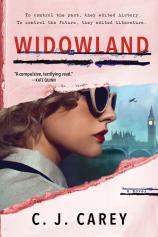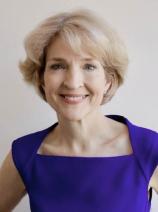Interview: August 18, 2022
WIDOWLAND by C. J. Carey is a thrilling feminist dystopian novel set in an alternative history that terrifyingly imagines what a British alliance with Germany would look like if the Nazis had won WWII. In this interview conducted by Bookreporter reviewer Rebecca Munro, Carey talks about her inspiration for the book’s premise; explains how she approached her research of major historical moments and figures to write the story; introduces readers to her main character, Rose, and Rose’s role in society; and offers a sneak peek at the sequel to WIDOWLAND, THE LAST QUEEN, which takes place two years later in 1955.
Bookreporter.com: Your book, WIDOWLAND, is set in a dystopian version of our world in which England has formed a protectorate with Germany known as the Grand Alliance. What inspired you to take this view of German-occupied England?
C. J. Carey: Every author who writes WWII fiction has asked themselves the “what if?” question. What would have happened if Edward VIII had remained on the British throne and England and Germany had formed an Alliance. My Clara Vine series, written under the name Jane Thynne, is set in prewar and wartime Europe, and focuses on life for German women under the Nazis. Using that background, I made the leap to imagine how the British would have adapted to such a regime.
BRC: As part of the Alliance, England has been forced to adopt the Rosenberg Assessment Procedure, a scientifically rigorous method of classifying every female over the age of 14. Through this method, women are classified in a caste system as Gelis, Klaras, Lenis, Paulas, Magdas, Gretls and Friedas. Can you describe these labels and explain how you chose the names? How do the labels become self-fulfilling as the caste system takes hold?
CJC: The female castes, which range from Class I to Class VI, are given nicknames, in the way that terrible things sometimes are. The names stem from women in the Leader’s life. It was obvious that the elite women should be named after Geli Raubal, Hitler’s beloved niece, and the class for mothers should be named after his own mother, Klara. The caring professions are nicknamed after Paula, his sister, and professional women after the official Third Reich film director, Leni Riefenstahl. Because rations, living area and clothing vary according to caste, the class system becomes a self-fulfilling prophecy. Poor women become poorer while elite women flourish.
BRC: The setting and classification system in your book are imagined but based on very real history. How did you approach your research of major historical moments and figures to write WIDOWLAND? What were some of the more shocking discoveries you made in your research?
CJC: The name given to the marginalized widows in the novel, “Friedas,” came from my research into the conditions of women in WWII Germany. In the late stages of the war, women over 50 with no husband or children were dubbed “Friedhofsfrauen,” or “cemetery women.” That was one example of how studying the domestic and social life of Germany helped in imagining an alternative Britain. I’ve been writing about Germany for more than a decade, so I have absorbed a lot about the Nazi leaders and their ideas for society. It’s safe to say almost everything about the Nazi regime is shocking, but I wanted to probe a particular aspect of authoritarianism, which is ordinary people’s willingness to accommodate atrocities and inhumanity towards their fellow citizens.
BRC: The novel’s main character, Rose, is an elite Geli who possesses celebrated “Nordic” features and has secured a comfortable role in the Chamber of Culture. Can you introduce us to Rose and explain her role in society? Is she based on anyone you know in real life?
CJC: As an elite young woman, Rose has a privileged apartment in Bloomsbury and a great job in the Culture ministry where her looks have attracted the attention of her boss. When he makes an approach, Rose is not in any position to refuse him, yet in a way she enjoys the privileges that a liaison with a senior man brings. Besides, there’s a death of native men in Britain because they have been rounded up for Extended National Service on the mainland. Rose’s sister, Celia, has had to settle for a much older husband, and they have produced a single child, Hannah, who Rose dotes on. I suppose, in that Rose is a keen secret writer of stories, she reminds me of my younger self.
BRC: At the start of WIDOWLAND, the Alliance is only 13 years old, so while characters like Rose remember the day the Alliance was announced and the change of hands from British control to German, other characters, like Rose’s young niece, have only ever lived in German-controlled England. How does the passage of time affect your characters and their memories of “before”? What was your aim in showing these different perspectives of this major historical moment?
CJC: I wanted to show how authoritarian societies like to control the Past in both crude and subtle ways. One way, quite simply, is to ban people from talking about “the Time Before.” Whether old or young, the less people think about the Past, the more they forget it. A more subtle way is to rewrite the Past by correcting history books, so the very source material is remodeled. Older people like Rose’s father, who are not so willing to forget the truth of the Past, are devalued and discredited.
BRC: The protectorate in England is notoriously keen on censuring public thought, opinion and works of art. But while the Chamber of Culture can prevent new, subversive works from making waves, it is harder to cleanse classic works from popular consciousness. As part of Rose’s work, she is tasked with “editing” classic works of fiction like PRIDE AND PREJUDICE, MIDDLEMARCH and JANE EYRE to “[adjust the] ideology” and make “minor correction[s] to some characters and themes.” How did you choose the books Rose works on, and what was it like revisiting them from an Alliance mindset?
CJC: The joy of writing Rose Ransom was to imagine someone encountering the great classics of English literature for the first time and finding them in conflict with everything she has been trained to believe. That required not only Rose, but the reader, to see the familiar afresh, which is what novels are intended to do. I deliberately chose novels that I knew readers would know, so they would appreciate the subtle changes that Rose is making.
BRC: While WIDOWLAND is clearly dystopian, there is also a bit of a mystery and thriller at its heart: graffiti encouraging citizens to “[s]trengthen the female mind by enlarging it and there will be an end to blind obedience” has begun to appear on government buildings, suggesting a resistance and potential assassination plot. This quote, from Mary Wollstonecraft, is a powerful yet clear message. How did you choose it, and how does it relate to the resistance in your book?
CJC: Mary Wollstonecraft was one of the first feminists, and the quote comes from her great tract, A VINDICATION OF THE RIGHTS OF WOMAN. It is a key message of WIDOWLAND because, while the regime is bent on limiting imaginative reading and narrowing the female mind, ultimately it is fiction that allows Rose to escape her narrow mindset and empathize with her fellow human beings. Mary Wollstonecraft was also the mother of Mary Shelley, whose novel, FRANKENSTEIN, plays a key role in the plot.
BRC: Under the rule of the Alliance, the characters in WIDOWLAND live in a surveillance state in which neighbors are encouraged to report on one another, and as a result of the ever-changing rules and regulations, a single misstep can easily land one in danger. How did you make the sense of paranoia and danger feel real in your characters?
CJC: My ideas for a surveillance society were greatly informed by a study of East Germany under the Stasi where a vast proportion of the population was recruited to spy on each other, including children on parents. The theme of ever-changing rules was largely inspired by lockdown, where in Britain, the regulations changed so fast that nobody could keep up.
BRC: As a response to constant surveillance, your characters have developed methods of silent communication, shorthand and symbols to communicate with one another. One of the more interesting ones is the return to the Victorian symbolism of flowers. Why did you choose flowers as a communication system? Were you already aware of the Victorian practice, or did you have to research different flowers and their meanings?
CJC: I was always interested in the symbolism of flowers --- red roses for love, violets for purity, rosemary for remembrance, etc. --- which was so popular in Victorian times. Even my mother wouldn’t allow white lilac in the house! Anyone can find flowers, and it’s hard to trace their origin, so they’re an easy way to communicate a subversive message. In Widowland, yellow flowers are widely understood as a symbol of the resistance.
BRC: The Leader of the Alliance claims to appreciate and value literature, and has even built a library based on the famed Library of Alexandria. But Rose comes to understand that his “appreciation” of literature is much more of an understanding and fear of the power of literature to motivate and inspire, noting that “words are weapons.” This is a timely observation given the rash of book bans occurring in the United States. Was this a conscious connection on your part?
CJC: It was very conscious. The censorship of fiction is, in every way, the central theme of this novel. The suppression of novels is not new --- everyone can picture the Nazi book burnings --- but I wanted to focus on more sophisticated and subtle methods of censorship. A redaction here, an abridgement there. It is testimony to the power of novels that authorities should want to control their content and we can’t relax our guard.
BRC: The Alliance is full of propaganda, and one character notes that England has become a “slogan world.” One of the most popular slogans of the Alliance is “Memory Is Treachery.” Can you explain the meaning behind this slogan, and why the Alliance emphasizes it so frequently?
CJC: Forgetting plays a crucial role in the building of a new society. Dwelling on the past only encourages people to make comparisons, so it’s always better to focus on the future. Likewise, the increasing use of slogans in both US and UK politics has been very striking --- simple snappy lines lend themselves to repetition, give an illusion of truth and prevent deeper analysis.
BRC: By the conclusion of WIDOWLAND, Rose has become fully immersed in the resistance, and you end the book on quite a cliffhanger. What can you tell us about the sequel and where we can expect to see Rose next?
CJC: WIDOWLAND’s sequel, THE LAST QUEEN, is set two years later in 1955. The Leader’s death has darkened daily life, and Britain is a land of spies. But in an unexpected turn of events, a state visit from President Eisenhower is announced, promising a rapprochement between the two countries and a reassertion of Alliance Britain on the world stage. The only potential problem is Queen Wallis. Now that she is widowed, she has become unpredictable, discontent and outspoken. On the eve of the state visit, she claims to have a secret that could blow the Alliance apart.








